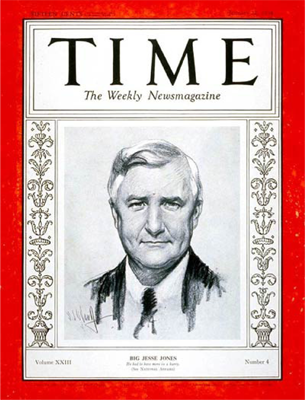Jesse H. JonesHouston ChronicleHall of Fame Class of 2009Jesse H. Jones, born in 1874 on his family’s prosperous tobacco farm in Tennessee, moved to Texas at age 20 to run an uncle’s Dallas lumberyard. That led him into construction, real estate and eventually, the newspaper business. After moving to Houston in 1898, he established his own business, the South Texas Lumber Company. He then began to expand into real estate, commercial buildings, and banking. In a few years he was the largest developer in the area and was responsible for most of Houston’s major prewar construction.
Between 1908 and 1918 he organized and became chairman of the Texas Trust Company and was active in most of the banking and real estate activities of the city. By 1912 he was president of the National Bank of Commerce (later Texas Commerce Bank, and by 2008, part of JPMorgan Chase & Co.) He also made one of his few ventures into oil, as an original stockholder in Humble Oil and Refining Company (now ExxonMobil). Recognized nationally for his business acumen, Jones served as director general of military relief for the American Red Cross during World War I at the behest of President Woodrow Wilson. President Herbert Hoover appointed Jones to the Reconstruction Finance Corp., a federal agency that played a major role in combating the Great Depression and financing industrial expansion in World War II. In 1940, after Congress passed a special resolution allowing Jones to become President Franklin Roosevelt’s secretary of commerce while maintaining his RFC position, the ‘Saturday Evening Post’ reported, “Next to the President, no man in the government and probably in the United States wields greater powers.” Today scholars give Jesse Jones a tremendous amount of credit for the role he played in saving capitalism during the Great Depression and mobilizing industry in time to fight and win World War II. Jones made significant contributions to Houston and Texas, establishing the large philanthropic institution Houston Endowment Inc. with his wife Mary Gibbs Jones. The University of Texas at Austin named its College of Communication for Jones, and his name appears on many Houston landmarks After a brief illness, he died on June 1, 1956. Jones was inducted into the Texas Newspaper Hall of Fame in 2009 as one of four members of the Hall’s third class of honorees. |





 In 1908, Jones constructed a new office and plant for the rapidly growing Houston Chronicle in exchange for a half-interest in the company. The relationship between Jones and the Chronicle would last the rest of his life. In 1926, Jones became the sole owner of the paper and named himself as publisher. Although in 1937, he transferred ownership of the paper to the newly-established Houston Endowment Inc., he retained the title of publisher until his death in 1956.
In 1908, Jones constructed a new office and plant for the rapidly growing Houston Chronicle in exchange for a half-interest in the company. The relationship between Jones and the Chronicle would last the rest of his life. In 1926, Jones became the sole owner of the paper and named himself as publisher. Although in 1937, he transferred ownership of the paper to the newly-established Houston Endowment Inc., he retained the title of publisher until his death in 1956.